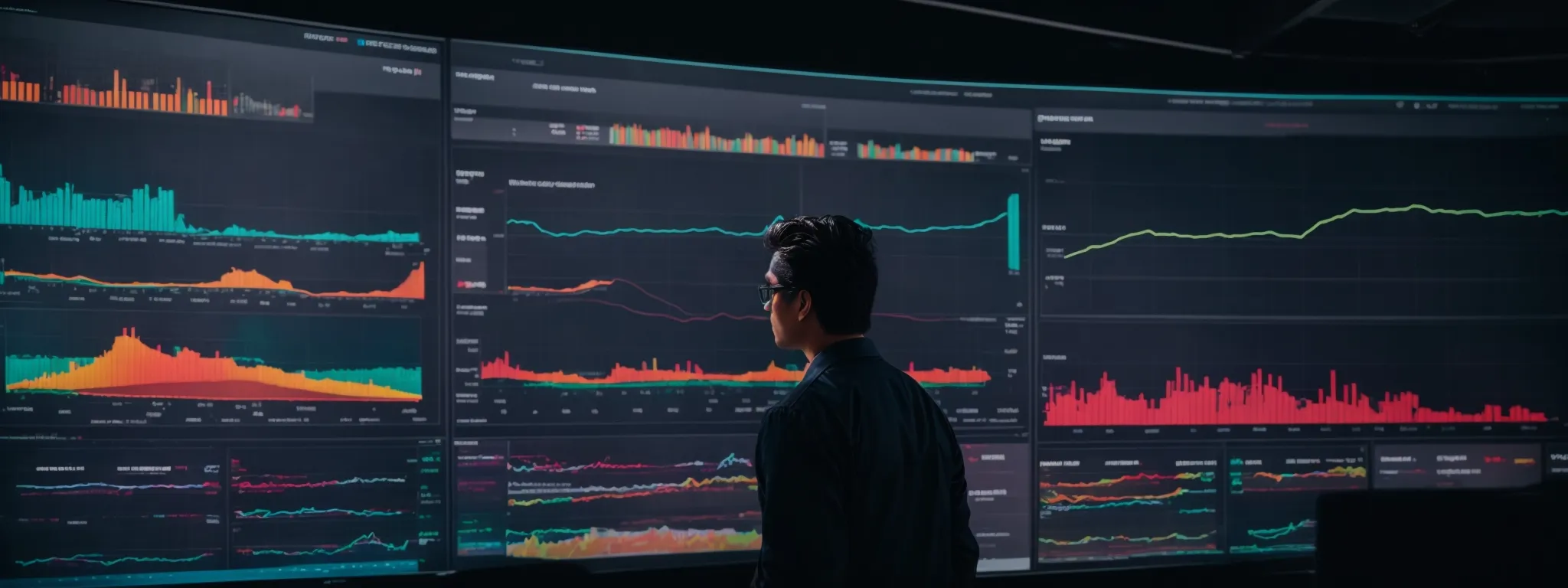Ultimate Digital Marketing Guide
Mastering Online Success: The Ultimate Digital Marketing Guide In a world where audiences’ attention spans are ever-diminishing, mastering online success hinges upon an impactful digital marketing strategy. […]
Mastering Online Success: The Ultimate Digital Marketing Guide
In a world where audiences’ attention spans are ever-diminishing, mastering online success hinges upon an impactful digital marketing strategy.
From understanding the intricacies of customer engagement to effectively utilizing diverse marketing channels, the journey toward digital excellence is both complex and rewarding.
A tailored approach that aligns with your brand presence, values, and targets the right buyer persona can set the stage for unparalleled growth and brand awareness.
This ultimate guide to digital marketing unpacks the essentials, providing a roadmap for organizations eager to commence, or refine, their journey in the digital landscape.
Keep reading to unlock the full potential of your digital marketing endeavors with actionable insights and expert recommendations.
Key Takeaways
- Effective Digital Marketing Strategies Align Closely With Business Goals and Adapt to Changing Online Consumer Behavior
- LinkGraph’s Suite of Tools, Including SearchAtlas SEO Software, Enables Businesses to Refine Their Digital Strategies for Maximum Impact
- Segmentation and Personalization in Email Marketing Drive Higher Engagement Rates and Propel Conversions Forward
- Data Analytics and the Strategic Use of KPIs Are Essential for Optimizing Digital Marketing Efforts and Achieving Measurable Success
- Continuous Learning and Adapting of Digital Marketing Tactics Are Crucial for Staying Current With Trends and Maintaining a Competitive Edge
Building a Strong Foundation for Digital Marketing Success

Embarking on the journey of digital marketing requires not only an understanding of its varied components but also an appreciation for how they intricately interlink to form a robust structure.
Effective digital marketing rests on the pillars of strategy, goal alignment, and the agility to adapt to ever-evolving trends.
In the quest to forge a strong foundation for online success, businesses must first unravel the essential threads of internet marketing, thereafter weaving these fibers into a tapestry that aligns seamlessly with organizational aspirations.
Staying current with the dynamism of digital landscapes ensures that marketing efforts resonate with the intended audience and foster enduring connections.
The ensuing discussions aim to demystify the cornerstones of digital marketing, instilling the know-how to craft a holistic strategy tailored to propel any business towards its objectives, and fortify its presence in a competitive, digital-centric world.
Understanding the Basics of Digital Marketing
The core of digital marketing lies in its ability to connect a brand with its target audience through the digital universe. This involves a myriad of tactics, from leveraging social media platforms to executing search engine marketing, each designed to enhance visibility and foster customer engagement.
At its heart, the effectiveness of digital marketing pivots on the understanding of the buyer persona and the crafting of messages that resonate. By harnessing data-driven insights, businesses can tailor their approach, meeting their customers where they are most active and receptive.
Learning the Importance of a Cohesive Strategy
To succeed in the digital realm, an organization must approach its marketing efforts as a unified front. A cohesive strategy ensures that every campaign, post, and marketing message advances the overarching goals of the company and speaks with one voice across all channels. LinkGraph’s Suite of Tools, like the SEO Content Assistant, serves as the linchpin in creating a harmonious blend of content, search engine optimization, and user experience, driving an integrated marketing symphony.
Digital marketing strategies must be nimble, ready to pivot and grow alongside the company and the ever-shifting landscape of online consumer behavior. With tools such as the SearchAtlas Software, businesses are empowered to adapt their digital strategies in real-time, ensuring that whether it’s through social media advertising or PPC Google Ads campaigns, their messaging remains consistent and effective, reaching the right audience at the right moment with precision and purpose.
Aligning Your Business Goals With Digital Initiatives
For businesses exploring the digital terrain, the alignment of digital marketing initiatives with business goals is not just beneficial, it’s imperative. Establishing digital marketing objectives that mirror the company’s broader aspirations enables synergy between online efforts and overarching success.
Work begins by charting a course where each digital marketing tactic serves as a stepping stone toward the ultimate targets. Whether it’s enhancing brand awareness, boosting conversions, or cultivating customer loyalty, every move in the digital sphere should propel the organization closer to its vision.
| Business Goal | Digital Marketing Initiative | Tool/Service by LinkGraph |
|---|---|---|
| Brand Awareness | Social Media Marketing | Digital PR Services |
| Conversion Rate Improvement | Landing Page Optimization | SearchAtlas SEO Software |
| Customer Loyalty | Email Marketing Strategies | SEO Content Assistant |
Keeping Up With Digital Marketing Trends and Updates
Staying abreast of the latest digital marketing trends and updates is critical for businesses aiming to keep their strategies cutting-edge and effective. With the pace of change in online marketing rising rapidly, marketers must cultivate an environment of continuous learning to embrace new technologies, platforms, and consumer preferences that can impact the success of their digital marketing campaigns.
LinkGraph’s SearchAtlas SEO software emerges as a vital ally in this endeavor, equipping businesses with the insights needed to navigate the shifting digital landscape. The tool’s up-to-date analysis and reporting capabilities enable marketers to identify emerging patterns in consumer behavior swiftly, ensuring that their digital marketing tactics remain aligned with the current market demands.
Crafting a Robust Digital Marketing Strategy

As businesses venture into the vast expanse of online marketing, formulating a robust digital marketing strategy becomes the cornerstone of potential success.
This entails a careful dissection of the digital ecosystem to pinpoint the target audience, comprehend their online behavior, and conceptualize measurable objectives tailored to them.
Selecting an optimizer mix of digital marketing channels is pivotal in commandeering substantial mindshare of the audience, just as prudently allocating the marketing budget and resources determines the vigor and reach of digital campaigns.
Mastering these fundamental elements crafts the blueprint for a formidable digital marketing scheme that not only captivates consumers but also fosters tangible business growth.
Identifying Your Target Audience and Their Online Behavior
Initiating a digital marketing strategy demands risk assessment and meticulous scrutiny of the target audience, whose preferences and online activities guide the direction of all marketing efforts. A keen understanding of consumer behavior, employing analytics and market research, illuminates the path for creating content that speaks directly to the needs, desires, and habits of the target market, ensuring that each digital touchpoint is an opportunity for engagement and progression towards marketing goals.
Using tools like SearchAtlas’s keyword research tool, marketers can delve into the nuances of their audience’s search patterns, equipping themselves with the power to tailor campaigns that resonate on a personal level. Identifying not just demographics but psychographics and behavioral trends enables businesses to construct compelling narratives and experiences across digital platforms, effectively converting visitors into loyal customers.
Setting Measurable Objectives for Your Digital Campaigns
Setting measurable objectives for digital campaigns crystallizes an organization’s vision into quantifiable benchmarks, essential for steering marketing efforts towards clear-cut outcomes. It transforms abstract aspirations into actionable targets, ensuring every digital initiative, from content marketing strategy to social media advertising, is evaluated against concrete data points and KPIs that reflect business growth and campaign effectiveness.
With an array of Digital Marketing Tools available, the precision afforded by SearchAtlas’s analytical features stands out. It allows marketers to establish and track goals such as lead generation, conversion rates, and customer engagement within their digital marketing campaigns, offering clarity on progress and areas needing optimization, which is fundamental in the pursuit of digital excellence and a high ROI.
Choosing the Right Mix of Digital Marketing Channels
Selecting the ideal combination of digital marketing channels is akin to assembling a symphony, where each instrument plays its part to create a harmonious outcome. It’s essential for digital marketers to discern which platforms will amplify their message, reach their target audience, and support their overall marketing objectives.
By leveraging the sophisticated analysis provided by LinkGraph’s SearchAtlas SEO software, organizations are equipped to make informed decisions about their channel mix, ensuring they optimize engagement and precisely direct their marketing resources where they will yield the highest returns.
Allocating Budget and Resources for Maximum Impact
Allocating the digital marketing budget with strategic acumen is paramount for organizations seeking to optimize their online impact. Within this balancing act, businesses must navigate the allocation of funds across PPC campaigns, content creation, and digital PR services, focusing on those avenues that promise the highest engagement and conversion rates relative to cost.
LinkGraph’s comprehensive suite of tools provides invaluable insights that assist in this financial orchestration, charting a course for expenditure that aligns with the intricate map of consumer behavior and market trends. By allocating resources judiciously, companies can enhance the potency of their marketing campaigns while adhering to their financial constraints.
Leveraging Content Marketing for Online Success

In the tapestry of digital marketing, content marketing emerges as a vital thread, interwoven with the potential to captivate and retain the audience’s attention.
The mastery of crafting valuable content that deeply resonates with consumers is often the difference between an unnoticed brand and a powerhouse in the digital domain.
To amplify the reach and impact of content, savvy use of SEO best practices is paramount, shining a spotlight on the value businesses provide.
Beyond creation, the strategic promotion of content through dynamic channels like social media and tightly curated email marketing campaigns unlocks doors to enhanced user engagement.
Yet, the cycle of content marketing is incomplete without measuring its success, demanding meticulous analysis to refine strategies and ensure the most resonant messaging reaches and moves the target audience.
This comprehensive approach to content marketing not only elevates a brand’s narrative but also solidifies its place in the crowded digital marketplace, securing online success.
Creating Valuable Content That Resonates With Your Audience
For a brand to truly reverberate within its niche, the content it releases should strike a chord with its audience. This symphony of relevance and value is composed by deeply understanding consumer queries, pain points, and aspirations, resulting in material that not only informs but also inspires and solves real-world problems.
Crafting content with the end-user in mind leverages the psychological landscape of the consumer, fostering a genuine connection between the brand and its audience. By utilizing tools like LinkGraph’s SEO Content Assistant, brands can ensure that each piece is not only rich in valuable insights but also strategically aligned with search engine algorithms for maximum visibility and reach.
| Content Type | Audience Engagement Goal | LinkGraph Tool/Application |
|---|---|---|
| Blog Posts | Educate and Inform | SEO Content Assistant |
| Infographics | Simplify and Visualize Data | Content Planner Tool |
| Email Newsletters | Consistent Engagement | Free SEO Audit |
Utilizing SEO Best Practices to Increase Visibility
SEO best practices are the beacon that guides potential customers to a brand’s digital doorstep. By intricately interweaving targeted keywords, crafting meta tags that capture user intent, and optimizing website architecture, businesses elevate their visibility in search engine results, carving out a space where their message can be clearly seen and heard by those who matter most – their audience.
Success in the virtual arena hinges on a brand’s ability to harness SEO techniques that adhere to the continually evolving algorithms of search engines. Utilizing the comprehensive capabilities of SearchAtlas SEO software, businesses can refine their websites to ensure they are not only noticed but preferred by search engines, thereby boosting their organic reach and establishing an authoritative digital presence.
Promoting Content Through Social Media and Email Marketing
Integrating social media into the promotional mix, firms impart a narrative quality to their content, sparking conversations and building communities around their brand. Platforms like Facebook, Instagram, and LinkedIn become stages for strategic storytelling, transforming followers into brand advocates and amplifying reach organically through shares and interactions.
Email marketing, contrastingly, invites a personal dialogue with the consumer, delivering tailored messages directly into their inbox. This targeted approach not only nurtures leads but also serves as a constant reminder of the brand’s value proposition, reinforcing relationships and boosting customer loyalty over time.
Measuring the Success of Content Marketing Efforts
Measuring the success of content marketing efforts translates into gaining insights on how well the content resonates with the target audience. It is the deep dive into analytics that reveals the narrative of visitor interactions, the reception of the material, and ultimately, the return on investment for marketing strategies employed.
The scrutiny of performance analytics helps marketers refine their content marketing strategy, sharpening their focus on creating material with the power to truly engage and convert. Key metrics include engagement rates, conversion rates, and social shares: indicators that collectively paint a picture of content efficacy and influence on consumer behavior.
- Evaluating engagement through metrics such as time spent on page and comments.
- Tracking conversion rates to determine the content’s impact on sales or lead generation.
- Assessing content reach and virality through social shares and mentions.
Maximizing Reach With Social Media Marketing

In the digital marketing realm, social media has risen as a formidable force, uniting brands with their audiences in spaces where engagement and interaction flourish.
As an integral part of a comprehensive digital marketing strategy, mastering social media marketing is pivotal for brands aspiring to expand their outreach and bolster their influence.
From the selection of the prime platforms that resonate with their target market to the curation of content that sparks conversation and community, businesses must navigate the social media landscape with strategic finesse.
Delving further, companies leverage paid advertising techniques to penetrate deeper into their desired demographics while rigorously analyzing performance data to hone their strategies.
These concerted efforts in social media marketing are not only about broadcasting a brand’s message but also about carving a niche of relevance within the digital ecosystem, enabling meaningful connections and measurable growth.
Selecting the Most Effective Platforms for Your Brand
Choosing the appropriate social media platforms is critical for digital marketers as it determines where and how a brand’s message will resonate with its audience. The decision should rest on where the target market congregates and the nature of interaction they prefer: fast-paced, visually driven, professional, or casual conversation spaces.
Identifying the most effective platforms also depends on the type of content a brand intends to promote. A brand seeking to captivate with visually engaging content may lean towards Instagram, while one looking to engage in thought leadership might find LinkedIn more suitable:
- Engraining brand identity on visually-centric platforms like Instagram and Pinterest.
- Engaging in B2B marketing and professional networking on LinkedIn.
- Fostering community discussions and customer service via Twitter.
- Leveraging Facebook’s extensive user base for broad demographic reach.
Engaging With Your Audience Through Consistent Posting
Engaging your audience through consistent posting is elemental for maintaining a dynamic and interactive social media presence. A regular cadence of content delivery keeps your brand top-of-mind for consumers, facilitating a steady stream of communication and enhancing brand recall.
This proactive approach to social media marketing fosters an environment where steady engagement can snowball into increased followers and deeper consumer relationships. Methodical and strategic posting schedules serve as the backbone of this engagement, enabling brands to become a dependable source of information and relevance in their audience’s digital journey.
Implementing Paid Social Media Advertising Strategies
Implementing paid social media advertising strategies demands precision and strategic expertise to ensure every dollar invested translates into tangible results. Brands seek to fine-tune their social media campaigns, harnessing the strengths of each platform, from targeting capabilities to ad format selections, ensuring a captivating audience encounter that leads to valuable an actionable outcome.
In navigating the complexities of paid advertising, businesses wield the power of data analytics and A/B testing, as offered by LinkGraph’s suite of Digital Marketing Services, to continually optimize their ads for performance, engagement, and ROI. This approach of methodical refinement ensures that paid social media strategies contribute effectively to the larger goals of the digital marketing plan, resonating deeply with the target audience and elevating the brand’s online presence.
Analyzing Social Media Metrics to Refine Your Approach
Analyzing social media metrics is pivotal for businesses to hone their online strategy and enhance their digital footprint. It involves scrutinizing data that reflects user engagement and the reach of social media posts, enabling organizations to understand the efficacy of their content and campaigns.
Through this analysis, companies can discern which types of posts drive the highest levels of interaction, allowing them to adjust their content and promotional efforts accordingly. Data-driven refinements lead to more personalized and impactful connections with their audience, thus optimizing the overall social media marketing strategy.
Enhancing Conversion Rates With Email Marketing

In the arena of digital marketing, email marketing stands as an essential pillar, boasting the dual capacity to nurture leads and catalyze conversions.
As businesses strive to fine-tune their marketing strategies, email marketing unfolds as a prime conduit for personalized communication, allowing messages to land directly in the inbox of an already engaged audience.
The ensuing focus on building and segmenting email lists ensures each recipient feels the intent of a carefully tailored message.
Additionally, the art of crafting email campaigns that evoke action, coupled with the science behind testing for optimal engagement, become critical steps in converting subscribers into steadfast customers.
Such meticulous efforts, when seamlessly integrated with broader digital marketing endeavors, can result in a robust system geared towards maximising both reach and impact in the digital echosphere.
Building and Segmenting Your Email List for Tailored Messages
For a digital marketing strategy to thrive, the segmentation of an email list emerges as a pivotal process, ensuring that each message resonates with a distinct segment of the audience. This tailored approach enhances the relevancy of communication, fostering a deeper connection between the brand and its subscribers, which in turn, can significantly boost conversion rates.
| Email List Segment | Segment Characteristics | Projected Outcome |
|---|---|---|
| New Subscribers | Recent sign-ups, seeking introductory information | Increased brand familiarity and trust |
| Engaged Customers | Frequent openers and click-throughs, ripe for upselling | Higher average order value and loyalty |
| At-Risk Customers | Low engagement, slipping away | Rekindled interest and restored engagement |
Individualizing messages based on subscriber activity and demographic data enables an organization to send content that genuinely interests each recipient: from welcome emails that set the stage for a growing relationship with new subscribers to re-engagement campaigns designed to win back the waning interest of long-time customers. Mastery of this segmentation strategy stands as a cornerstone in the architecture of a successful email marketing campaign, fostering higher engagement rates and propelling conversions forward.
Crafting Compelling Email Campaigns That Drive Action
The art of email marketing hinges on the creation of campaigns that not only captivate the reader but also compel them towards action. By focusing on crafting subject lines that pique curiosity and content that speaks directly to the recipients’ needs, digital marketers can significantly elevate open rates and foster an environment primed for conversion.
Moreover, a compelling call-to-action serves as the linchpin of a successful email campaign, guiding readers with clear, persuasive language towards the next steps in their customer journey. LinkGraph’s Data-Driven Marketing Approach helps businesses finely tune their messages, ensuring each campaign is a strategic step toward enhancing user engagement and achieving higher conversion rates.
Testing and Optimizing Emails for Higher Open and Click Rates
The relentless pursuit of excellence in email marketing necessitates rigorous testing and optimization for each campaign. A meticulous approach to A/B testing allows marketers to distill the secret sauce for compelling subject lines and content structures, significantly boosting open and click-through rates by honing in on the preferences and behaviors of their audience.
LinkGraph’s Suite of Digital Marketing Tools, including the SEO Content Assistant, provides critical insights for optimizing email content. By analyzing user engagement and iterating on successful elements, marketers ensure their emails not only reach the inbox but also spark the desired action, laying the groundwork for successful conversions and sustainable business growth.
Integrating Email Marketing With Other Digital Efforts
Integrating email marketing within the broader spectrum of digital strategies epitomizes a holistic approach, ensuring consistent messaging and reinforcing brand narratives across all online touchpoints. A united front maximizes overall campaign efficacy, leveraging email marketing to support and amplify the reach of social media, content marketing, and PPC initiatives.
By synchronizing email campaigns with ongoing digital marketing activities, businesses create a seamless experience for consumers, bridging the gap between various channels and fostering a cohesive relationship with the audience:
- Complementing social media campaigns by using email to provide in-depth content.
- Driving traffic to optimized landing pages from targeted email promotions.
- Reinforcing PPC campaigns with follow-up emails that nurture leads through the sales funnel.
Harnessing the Power of Data in Digital Marketing

In the evolving landscape of digital marketing, the ability to collect, analyze, and act on data stands as a beacon guiding organizations to unparalleled success.
Far beyond mere numbers, data forms the DNA of informed strategies, the lifeblood of effective decision-making processes, and the fuel for the ongoing optimization of digital campaigns.
Within this subsection, we explore the integral role of analytics in achieving marketing success—a journey through the practical use of data to draw actionable insights, meticulous tracking of key performance indicators, and the unwavering commitment to refine campaigns continually in pursuit of excellence.
As the digital ecosystem becomes increasingly data-driven, the art of wielding information effectively is a potent tool for those aiming to master the vast domain of online marketing.
Understanding the Role of Analytics in Marketing Success
Analytics in digital marketing serves as the compass that orients organizations towards their aspirations. By meticulously discerning patterns within vast datasets, companies gain the ability to not only capture a snapshot of current performance but also forecast future trends, ensuring that their digital marketing efforts are grounded in empirical evidence and strategic foresight.
Embracing analytics equips marketers with the insights to fine-tune campaigns, identify high-return channels, and ultimately foster a culture of data-driven decision-making. These analytical insights are paramount for pinpointing areas that excel, require adjustment, or present untapped opportunities, thereby maximizing the efficacy of digital marketing initiatives and securing a competitive advantage in the bustling online marketplace.
Utilizing Data to Make Informed Marketing Decisions
In the digital marketing arena, the astute application of data shapes strategy and drives competitive advantage. Firms that leverage the wealth of information at their fingertips can make calculated decisions, react swiftly to market changes, and ensure that each marketing move is grounded in solid evidence, heightening the probability of achieving their marketing goals.
Data-driven decisions anchor the relentless pursuit of optimizing marketing efforts and budget allocation. By interpreting customer data, ecosystem feedback, and campaign analytics, businesses can streamline their approaches, deliver targeted content, and enhance the user experience, heralding efficiency, and effectiveness across their digital marketing campaigns.
Tracking and Analyzing Key Performance Indicators (KPIs)
Key Performance Indicators (KPIs) are the navigational stars of the digital marketing galaxy, guiding businesses through the darkness of uncertainty towards the illumination of measurable success. With precise KPI tracking, companies gain real-time insight into the effectiveness of their marketing tactics, empowering them with the agility to adapt and thrive in the fast-paced digital arena.
It is through the meticulous analysis of KPIs that organizations distill the essence of data into strategic wisdom: discerning patterns, measuring progress, and pinpointing areas ripe for optimization. The orientation provided by KPIs not only bolsters confidence in decision-making but also ensures that marketing investments yield substantial, quantifiable returns:
- Analyzing website traffic to evaluate the reach and appeal of digital content.
- Assessing conversion rates to determine the effectiveness of calls-to-action and user experience.
- Measuring customer engagement through social media interactions that reflect brand resonance.
Continuously Improving Campaigns Based on Data Insights
The iterative refinement of digital marketing campaigns is propelled by the analytical insights derived from continuous data monitoring. This cyclical process involves deploying, measuring, and refining tactics to perpetually enhance campaign performance, thereby embedding a culture of perpetual growth and learning within the trajectory of a company’s digital marketing journey.
Leveraging SearchAtlas SEO software, businesses can translate data patterns into actionable strategies, finessing their approach with each iteration. This perpetual cycle of improvement fosters leaps in efficiency and effectiveness, ensuring each campaign resonates more profoundly with the target audience, optimizes resource allocation, and maximizes overall return on investment.
Conclusion
Mastering online success is crucial to thriving in today’s digital-first world.
This ultimate guide emphasizes the importance of laying a strong foundation for digital marketing, combining a deep understanding of your target audience with a cohesive strategy and the flexibility to adapt to changing trends.
It underscores the significance of aligning digital initiatives with business goals, using data-driven tools like LinkGraph’s SearchAtlas to stay ahead of the curve.
A robust digital marketing strategy is also pivotal, requiring strategic allocation of budgets and resources for maximum impact.
Content marketing is identified as a key player, with its ability to engage audiences and enhance brand narratives.
Furthermore, the guide highlights the power of SEO to amplify visibility and the effectiveness of social media and email marketing in building relationships and driving conversions.
Learning to navigate the nuances of each platform ensures that messages resonate more powerfully.
The guide also recognizes the necessity of measuring content marketing success, constantly refining approaches based on data insights to optimize campaign results.
Ultimately, mastering digital marketing involves using analytics to inform decisions, track KPIs, and continuously improve, ensuring sustained online success and a significant competitive edge.















































































